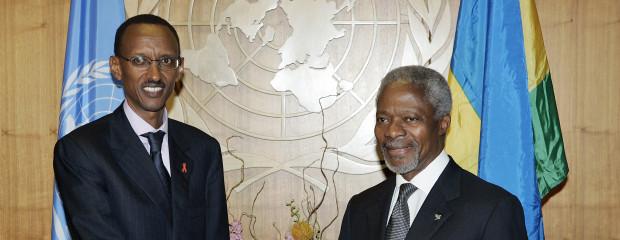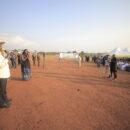How did Rwanda’s genocide change our world? – By Omar McDoom

 Rwanda’s genocide, twenty years ago this month, symbolizes the zenith of ethnic violence in Africa and international indifference toward it. How did this defining event change our world? It is true that mass atrocity is still not a ghost of the past and international inaction in the face of it is still not an unthinkable choice. Events in the Central African Republic and Syria today serve as dark reminders of each of these realities. Yet we would be overly cynical to think nothing has changed. The hundreds of thousands of lives so brutally taken in Rwanda left a mark on the world’s conscience and moved us a little closer toward making “˜never again’ a credible promise.
Rwanda’s genocide, twenty years ago this month, symbolizes the zenith of ethnic violence in Africa and international indifference toward it. How did this defining event change our world? It is true that mass atrocity is still not a ghost of the past and international inaction in the face of it is still not an unthinkable choice. Events in the Central African Republic and Syria today serve as dark reminders of each of these realities. Yet we would be overly cynical to think nothing has changed. The hundreds of thousands of lives so brutally taken in Rwanda left a mark on the world’s conscience and moved us a little closer toward making “˜never again’ a credible promise.
Inaction over Rwanda moved Kofi Annan in 2001, as UN Secretary-General, to ask when intervention is ever justified. “[I]f humanitarian intervention is, indeed, an unacceptable assault on sovereignty, how should we respond to a Rwanda, to a Srebrenica””to gross and systematic violations of human rights that offend every precept of our common humanity?” A year later, in a paradigm-shifting answer, an international commission re-cast state sovereignty as responsibility rather than control.
While neither universally accepted nor legally binding, the notion of a “˜responsibility to protect’ (R2P) decisively entered the lexicon of international relations. R2P signifies more than mere rhetorical change. In authorizing intervention in Darfur in 2006, the UN Security Council took the unprecedented step of explicitly invoking R2P. Its normative power is reflected in the more robust mandates of UN peacekeeping missions since Rwanda. The protection of civilians is now central to UN operations in the DRC, Mali, Ivory Coast, and South Sudan.
The tribunals established for Rwanda, and for Yugoslavia, also lent momentum to the movement for an international institution of criminal justice. The idea had waxed and waned for decades, but the International Criminal Court (ICC) opened its doors eight years after the genocide. Critics accuse it of inefficiency and political bias: two convictions in 12 years and all eight investigations focused on Africa. Yet the Court still stands as perhaps the most significant achievement of the human rights movement since the end of the Cold War.
Rwanda also helped draw the world’s attention to the scourge of sexual violence during war. In a landmark judgment, the Prosecutor vs Akayesu, the International Criminal Tribunal for Rwanda recognized rape, if intended to destroy a group, as a ground for genocide.
Rwanda’s violence has also generated much research and taught us much about ethnic conflict and genocide. Research has, for instance, helped debunk the myth that tribal violence on the continent is the product of ancient, immutable hatreds. We now know the genocide was the premeditated choice of a small elite intent on staying in power. Rwanda has also become a cautionary tale for international mediators about the risks of using democratization as a strategy for ending civil wars. Multipartyism brought ethnic extremism to the forefront of Rwandan politics. The newly-created opposition parties helped push the ruling elite into taking radical steps to ensure its survival.
Research on Rwanda has also cast light on a dark side of the human psyche: how ordinary people become capable of extraordinary violence. An estimated one-in-five ethnic Hutu men committed violence during the genocide. My own research suggests this remarkable level of popular participation may be traced in part to Rwanda’s high population density. The dense social networks that characterized rural Rwanda amplified the powerful social forces of conformity, coercion, and cooptation at work during the genocide.
But what has changed inside Rwanda itself since the genocide? The country has enjoyed a remarkable period of social stability. There has not been a serious incident of ethnic violence in Rwanda for nearly two decades. Donors have praised the country’s astonishing development. Economic growth has averaged over 6% per year, poverty and inequality have declined, child and maternal mortality have improved, and primary education is now universal and free. Rwanda has shown, in defiance of expectations, that an African state can deliver security, public services, and rising prosperity.
Yet, politically, there is some troubling continuity with pre-genocide Rwanda. Power remains concentrated in the hands of a small, powerful ethnic elite led by a charismatic individual with authoritarian tendencies. In form, current president Paul Kagame and his ruling party, the RPF, the heroes who ended the genocide, appear to exercise power in a manner similar to former president Juvenal Habyarimana and his ruling MRND party, the actors closely-tied to those who planned the slaughter. The genocide is testament to what unconstrained power over Rwanda’s unusually efficient state machinery can enable.
Furthermore, today, as before, it is unclear how succession will occur. After two decades in office, president Habyarimana was assassinated and his regime overthrown through force and with enormous bloodshed. President Kagame is also approaching the twenty-year mark. Rwanda’s history tells us that on each of the three occasions power has changed hands from one ethnic elite to another, 1959-62, 1973, and 1994, it has been with violence. While few believe mass violence likely to recur, peaceful regime transition is the most important break with the past that many hope Rwanda’s future holds.
Omar Shahabudin McDoom is an Assistant Professor in Comparative Politics at the London School of Economics. He has been involved in research on Rwanda’s genocide and on Africa’s Great Lakes for over a decade.






Why The Absolute Need for African Exceptionalism
Africa is indeed truly “exceptional†in being “we must always considerâ€, John Winthrop proclaimed in 1630 while sailing to the New World, “that we shall be as a city upon a hill—the eyes of all people are upon us‗ Africa is “exceptional†in multi-decades of African national citizens being grounded down into almost depraved oblivion by their elected respective African National oligarchs who care not a ‘wit’ as to the national citizen social civic wellbeing; an egregious fundamental breach in the essential civic social contract binding together both the governed and those in privilege who govern.
Africa is in gross, urgent need of ‘exceptional transformative’ leadership, whose civic civil social governing matrix will indeed be grounded and constructed and inhabited by great men/women most aware of their fundamental most great moral trust and their most great responsibilities in being truly a servant of the people “as in a city upon a hill†where “the eyes of all people are upon usâ€. Africa must transform in a manner, method most civic civil deferential to all peoples subject to governance.
Monte McMurchy LL.D.
Kinshasa.
DRC
Omar McDoom’s is a good comment on what we learned in 1994 and hoped not to have to re-learn. But in much recent commentary on R2P, the point seems not sufficiently emphasised that its purpose was preventive or pre-emptive intervention, to avert the breakdown that would leave military (‘humanitarian’) intervention the last recourse in a collapsing or collapsed state.
Why the UN family of states rejected effective preventive intervention in 2005 is important. In doing so, it imposed a serious limitation on the success of the idea that the international community could judge a breakdown was approaching and might then agree to act to prevent it. All the discussion of ‘never again’ is about sending peacekeeping or peacemaking forces, and not about the civilian means of making them unnecessary.
Good piece, indeed let us hope for a non-violent transferral of power.
For more depth in terms of the genocide survivors have a read of Justice Africa Director Dr Rachel Ibreck’s contribution to the twenty year commemorations: ‘Rwanda’s genocide survivors: for memory and justice’
http://justiceafrica.com/ver2/?p=1022#more-1022
Correlations, should be drawn to the root causes of the events that led to inter ethnic violence, and genocide as it is well documented. Peaceful transitions in Uganda and Rwanda is core to the stability and democratisation for the next generation, within the East and central Africa. Rwanda and Uganda, thus owe Great Lakes as epitome of trust for the next peaceful generation.
However, long it will take, Governments of Uganda and Rwanda, must do what it takes, to hand over power peacefully, through a socially transparent and acceptible elections.
Repeats of the Arab spring style change of governments must be avoided at all costs. Egypt, Libya, South Sudan, and the rest stand the test of destroyed economies in Africa, that shall never regain stabilities in the next 20 years. What a shame!
I suppose if anything has changed, it is that we have made greater effort to include humanitarian dialogue, and action, in world politics. This is as it should be. Also – and long overdue – is the notion of ‘responsibility’ as opposed to ‘control’ when discussing power.
chloroquine antimalarial https://chloroquineorigin.com/# hydroxychloroquine meaning
hydroxychloroquine and zinc is hydroxychloroquine over the counter hydroxychloriqine
buy cialis usa cialis coupon